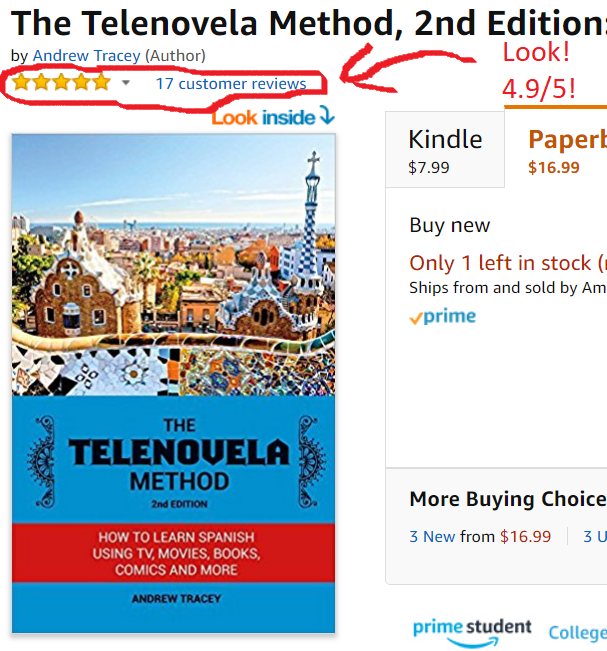 I just finished reading a fascinating and concise report from the U.S. Department of State’s FSI (Foreign Service Institute) entitled “Lessons learned from fifty years of theory and practice in government language teaching” that distills what FSI believe are the ten most important lessons learned from having spent the past fifty years teaching diplomats and spies foreign languages to a high level of proficiency, within six to twelve months, where those individuals were starting as complete beginners in the language they had to learn. I will explain what FSI is and why you should listen to them, I will give you a short summary of the report by telling you what the 10 lessons are (one sentence each), and then I will embed the report below so that you can either read it right here on this page or download it (PDF file) to read later as you please.
I just finished reading a fascinating and concise report from the U.S. Department of State’s FSI (Foreign Service Institute) entitled “Lessons learned from fifty years of theory and practice in government language teaching” that distills what FSI believe are the ten most important lessons learned from having spent the past fifty years teaching diplomats and spies foreign languages to a high level of proficiency, within six to twelve months, where those individuals were starting as complete beginners in the language they had to learn. I will explain what FSI is and why you should listen to them, I will give you a short summary of the report by telling you what the 10 lessons are (one sentence each), and then I will embed the report below so that you can either read it right here on this page or download it (PDF file) to read later as you please.
For those not familiar, FSI is held in very high regard in the language-learning and linguistics communities, they pioneered many different areas of language learning and a lot of the most successful techniques and courses in use are mostly if not entirely derived from FSI material and techniques. What is FSI and what does it do? FSI is the branch of the U.S. State Department which is responsible for teaching foreign languages to all State Department personnel and many personnel from other government agencies and the military. It is the training arm of the Foreign Service and as such runs other courses and classes such as management, diplomacy, culture, etc. but its largest department by far is its School of Language Studies, for which it is also best known.
Regarding FSI…
The reason FSI is held in such high regard is quite simply the standards that they are held to due to the people that they are responsible for teaching: FSI trains our diplomats, military interpreters and intelligence analysts, CIA officers, and some federal law enforcement personnel, and they have a very strict schedule within which they must operate and accomplish some fairly difficult feats. For example, from the text:
Our programs are not given a lengthy period in which to prepare learners to do their work. For example, students in the Russian program are expected to progress in ten months of intensive training from no functional ability in the language to the ability to read almost any professionally relevant text and discuss in detail with a Russian speaker any and all implications of that text for Russian-American relations. Ten months of intensive language study may seem like a long time, but, in fact, it is very short when the scope of the goal is considered. There is no time to waste with nonproductive activities.
Additionally:
The accountability goes far beyond test scores and end-of-training student evaluations. It goes to whether graduates of our programs can use the language to carry out the important and complex work for which they are responsible. If their language limitations cause them not to be able to do that work, the FSI program heads will hear about it in no uncertain terms. Language educators at FSI get direct evaluative feedback from our clients and stakeholders. When a dissatisfied cable comes to us from post, it receives our immediate attention.
Whatever it is that they’re doing, it has to work, there is no way that it couldn’t–if it didn’t work, and work well, then most of our diplomats (among many other people FSI is responsible for training) wouldn’t be proficient in the language of the country that they’re stationed in, and to say that this would cause problems would be putting it mildly. I’m not saying they’re the absolute best, I’m saying that you can be guaranteed that what they do does work and that they do know what they’re talking about–as far as the credibility of a source goes when it comes to language learning, it doesn’t get much better than this. That’s my point. I guess all I’m trying to do here is convince you that yes, it really is worth taking 30 minutes out of your day to read this report if you’re at all interested in language-learning.
The Top 10 Most Valuable Things Learned by FSI Over the Past 50 Years
This is just a very short summary if you simply don’t have time or want to get an idea of what it’s about before bothering with it, the actual report is below, 17 pages long, each of the following lessons are expanded on in that report with several paragraphs each, and it is absolutely worth reading in full so I highly recommend you do that. Here’s a very quick summary of their Top 10 Lessons, skip this if you’d just like to go straight to the report:
Lesson 1. Mature adults can learn a foreign language well enough through intensive language study to do things in the language (almost) as well as native speakers.
Lesson 2. “Language-learning aptitude” varies among individuals and affects their classroom learning success (but at least some aspects of aptitude can be learned).
Lesson 3. There is no “one right way” to teach (or learn) languages, nor is there a single “right” syllabus.
Lesson 4. Time on task and the intensity of the learning experience appear crucial.
Lesson 5. Learners’ existing knowledge about language affects their learning.
Lesson 6. A learner’s prior experience with learning (languages or other skills) also affects classroom learning.
Lesson 7. The importance of “automaticity” in building learner skill and confidence in speaking and reading a language is more important than has been recognized by the SLA [Second Language Acquisition] field over the last two decades.
Lesson 8. Learners may not learn a linguistic form until they are “ready,” but FSI’s experience indicates that teachers and a well designed course can help learners become ready earlier.
Lesson 9. A supportive, collaborative, responsive learning environment, with a rich variety of authentic and teacher-made resources, is very important in fostering effective learning.
Lesson 10. Conversation, which on the surface appears to be one of the most basic forms of communication, is actually one of the hardest to master.
The Report
I’ve embedded it below so that you should be able to read it right here on the page if you like, or you can just download the PDF file and read it on your computer, here’s a direct link to the file if you’d like to download it, and here’s the embedded version (click the magnifying glass to make it larger or click the arrow in the upper right hand corner to open it in a new tab or window with Google Docs):
I learned to speak conversational Spanish in six months using TV shows, movies, and even comics: I then wrote a book on how you can, too
I have a whole method and a book I wrote about it called The Telenovela Method where I teach you how to learn Spanish from popular media like TV shows, movies, music, books, etc. that you can all find online for free. It was the #1 new release in the Spanish Language Instruction section on Amazon for nearly a month after it came out and currently has 17 reviews there with a 4.9/5 stars average. It's available for $7.99-$9.99 for the e-book version depending on who you buy it from (Kindle version on Amazon is now $7.99) and $16.99 for the paperback (occasionally a bit cheaper, again, depending on who you buy it from).
It's currently available in both e-book and paperback from:
Cheers,
Andrew







